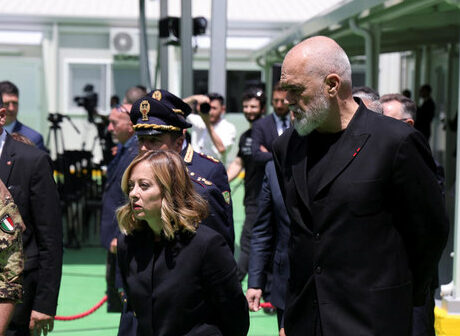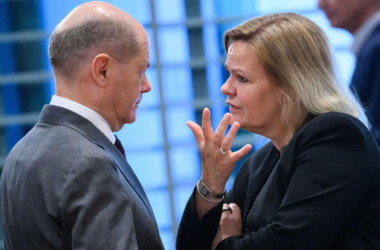Italy, facing the highest number of migrant arrivals in the European Union, has initiated a controversial strategy by opening the first of two planned migrant camps in neighboring Albania. This move is part of Europe’s pioneering “offshoring” scheme aimed at managing irregular migration.
The first camp, situated in the northern Albanian port of Shengjin, will accommodate up to 3,000 migrants monthly who are rescued en route to Italy. The second center, located on a former air force base in Gjader, has been delayed. Both facilities, funded and managed entirely by the Italian government, are designated for migrants intercepted in international waters, excluding women, children, and vulnerable individuals.
Upon arrival, migrants can apply for asylum in Italy. If their applications are rejected, they will be sent back to countries deemed safe. “Italian and European legislation will be applied in these centers,” stated Fabrizio Bucci, Italy’s ambassador in Albania. “It’s like having a center in Italy – but in Albania.”
The agreement, signed by the Italian and Albanian Prime Ministers, will last for five years, with a possibility of extension if successful in reducing Italy’s migrant burden and deterring future attempts.
This year, sea arrivals in Italy have dropped to around 31,000, more than half of last year’s figures. Italian Prime Minister Giorgia Meloni, who campaigned on a platform of stringent migration control, considers the Albania plan a key component of her policy.
The plan’s estimated cost of over €650 million (£547 million) has drawn criticism from Italian opposition politicians and human rights groups. “It’s an excessive cost to detain a limited number of migrants,” said Roberto Magi, an MP from the left-wing +Europa party. During Meloni’s recent visit to the site in Albania, Magi protested, raising concerns about the treatment of migrants and the overall purpose of the centers.
Some critics, like Magi, fear the inability of night-time rescuers to adequately screen for vulnerable individuals, such as victims of torture or sexual violence. They argue that the initiative is more about deterrence and public relations than practical solutions. However, Ambassador Bucci contends that the plan will make migrants and smugglers reconsider their routes.
The scheme has garnered support from 15 EU member states and praise from figures like Sir Keir Starmer, despite differences from the UK’s scrapped plan to deport failed asylum seekers to Rwanda. Unlike Rwanda, where the asylum process would be managed locally, Italy retains jurisdiction over the Albanian centers.
For Albania, the deal potentially bolsters its EU membership negotiations. However, the agreement was unexpected, given Prime Minister Edi Rama’s previous opposition to such arrangements, raising speculation about his motivations.
Vladimir Karaj, a journalist with the Balkan Investigative Reporting Network, noted that the Albanian government’s narrative highlights its historical ties with Italy. While the deal has sparked brief local protests, Karaj believes Albania may attract similar agreements from other Western nations seeking migration solutions.
“Albania needs the support it can get from the west,” Karaj said. “If Western governments see this as a viable solution, Rama’s assurances about it being exclusive to Italy might face challenges.”








